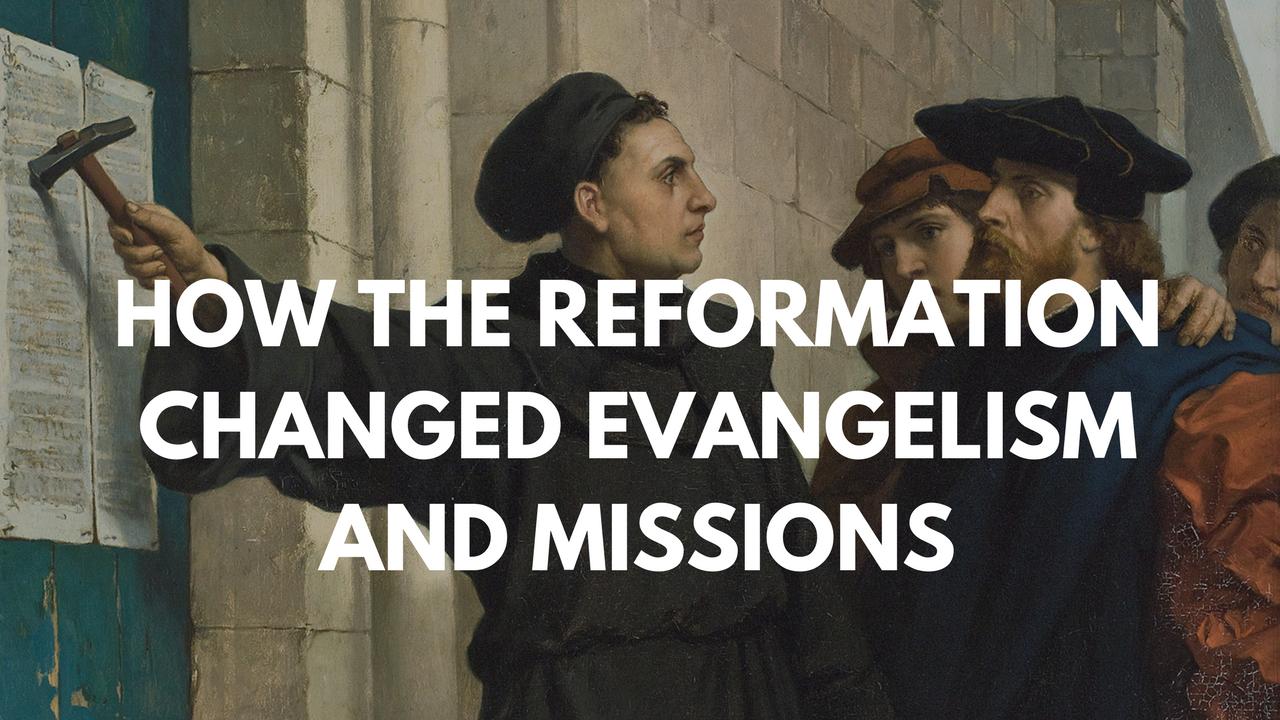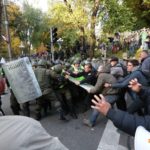Podcast: Play in new window | Download (Duration: 54:35 — 50.0MB) | Embed
Effects of Reformation on Evangelism and Missions
Reformation Remembrance Conference
Taylor Creek Church Oct 14, 2017
Intro:
For well over a generation in the US evangelism and missions have found a very favorable place in Protestant Churches. Just do a search online and you’ll end up with dozens if not hundreds of ministries and programs to help your church share the gospel. From the US came the “Jesus Film,” one of the most widely used evangelistic and missions tools ever! Most churches support missionaries, have missions conferences, and tell missions stories in Sunday School.
This is all good but it is also dangerous. Whenever any idea becomes so ubiquitous it also faces the danger of losing it’s Biblical foundation, becoming watered down, and running amuck with all kinds of fanciful modifications in an attempt to make it “contemporary,” “cutting edge,” or “culturally” relevant.
Fads in evangelism are never-ending and certainly the American church has seen every fad, trend, and style possible when it comes to evangelism. We’ve been taught to memorize salesy evangelistic type pitches, we’ve been shown how to “do life together,” we’ve been told that we can’t reach this generation until we look and smell, and talk like they do. And so some have let their beards grow out, put on a pair of suspenders, and developed a taste for microbrews all in hopes that they can “connect” with social trends.
On the other hand, others have held out, they’ve stalwartly stood by traditions of yesteryear, not moving an inch. They’d sooner have their ears cut off than listen to anything that’s not in their grandmothers hymnal. They are sure that their post WWII evangelism methods will work just the same in a Postmodern culture.
I hope you can see that both courses will eventually take us in the wrong direction. You may say, “Well, what we need is balance.” To some degree I agree, but I hesitate to call for balance as balance is generally a compromising position that is neither built on solid theology nor does it prove it usually it’s to be effective.
What is however, helpful to the church is a look at our methods and practices in light of Biblical truth and in reference to church history. It can be easier for us to see how these things play out as we look back several hundred years. Compressing those years often gives a clarity and that clarity can help us see where we are today and what possible changes might need to be taken
For many of the Reformers this is also how they came to their conclusions. First and most importantly they went to God’s Word, they went to the original languages and they studied! They exhumed truth from beneath hundreds of years of dust and dirt. But they were also students of church history, of the church fathers, and of current fads and traditions in the church.
I want to look with you at the Reformation time period. What was the culture of evangelism and missions like at the time of Martin Luther, Huldrych Zwingli, and John Calvin? And how did the Reformation change the church’s approach to sharing the gospel?
Of course we will look at some of the key issues at stake such as the nature of saving faith and the way we view the Church it’s self.
Catholic Missions
If you may think that missions was something forgotten about during the 15th and 16th century but if you then you are much mistaken. Beginning in the 14 hundreds and for the following few centuries there was great missionary endeavour by the Catholic Church. Remember that Christopher Columbus’ was himself sent by the Catholic Monarchs of Spain, Ferdinand II and Isabella I. Columbus’ task was not only to establish trading routes and new territory for Spain but also to convert the peoples of those lands to Christians.
During Columbus’ first voyage when he came to the Bahamas and in contact with the natives living there he wrote the following:
“They ought to make good and skilled servants, for they repeat very quickly whatever we say to them. I think they can very easily be made Christians, for they seem to have no religion. If it pleases our Lord, I will take six of them to Your Highnesses when I depart, in order that they may learn our language.”
Catholic missions in the 16th and 17th centuries were global and tended to correspond with political conquest of Catholic countries like Spain, France and Portugal. We can see the tremendous influence of these missions hundreds of years later especially in South America where Spanish.
The conquistadors were required by law to be Catholic and were always accompanied by Catholic priests who served as their teachers as well as their priests and who in the New World were often worked to “Christianize” the natives.
Characteristics of Catholic Missions
-
Military and political conquest
Historyian Stanley G. Payne notes:
-
- “For centuries the expansion of the faith was inextricably intertwined with military glory and economic profit. Because of this it is idle to ask, as is frequently done, whether the Portuguese pioneers and Castilian conquistadores were motivated more by greed or by religious zeal. In the Hispanic crusading expansionist ideology, the two went together. In Castile, particularly, wealth was based on [189] conquest and dominion, which in turn was the result of the expansion of Christendom against the Muslims. It was accepted by most as axiomatic that God made such wealth available because the expansionists were engaged in a righteous cause. Religious belief was whole and complete, and rarely admitted the possibility of any contradiction between worldly profit and religious aims in the expansion of Christian dominion, at least until the mid-sixteenth century. Crusading and profit were largely viewed as harmonious and complementary”. -A History of Spain and Portugal Volume 1
- Of course if we think of Catholic theology we understand that they viewed themselves as expanding and establishing the Kingdom of God! They saw the Church as a visible Theocracy whose expansion was ordained by Christ Himself.
- Just as any Kingdom would conquer through military might, so would they
- Just as any kingdom would would subjugate foreign people’s to themselves, so would they
- Just an any kingdom would look for ways to tax and prosper economically, so would they.
- Thus to conquer foreign lands militarily and politically was not seen as in tension with the mission of the church but rather in harmony with it.
-
Often forced conversions and mass conversions
- For centuries the Church had used forced conversions as a means to bring newly conquered peoples into Christendom.
- One of the most famous mass conversions happened in Kiev in 988 when Prince Vladimir called for all residents to come to the Dnieper river to be baptized or risk becoming and enemy of the Prince.
- Spain, Portugal, and France sent thousands of missionaries to Central and South America and Africa.
- Historian Thomas Gils notes: “Between 1493 and 1820, Spain sent some 15,585 missionaries to the Americas. Typically the government of Spain paid their full expenses. In the first fifteen years after the Spanish conquest of Mexico, Franciscans baptized about 5,000,000 Indians; priests in Mexico sometimes baptized thousands in a day.”
- Because the Catholic Church views baptism as one of the primary means of grace many priests saw no problem in forcing baptism upon many who had little to no understanding of the meaning of that baptism not to mention they didn’t have faith in Christ.
- For centuries the Church had used forced conversions as a means to bring newly conquered peoples into Christendom.
-
Included many aspects of syncretism
- Of course when you are busy baptizing thousands a day it’s really hard to give good Biblical instruction or to even know what is believed by those who are being baptized.
- This led to many aspects of paganism which remained in the Catholic Church.
- “Dia de los muertos” is a clear example of pagan ancestor worship from Aztec practices that was left nearly completely intact in the Catholic church.
- If you go to the Eastern Church you will also find very similar practices such as “Grobki/Radonitsa. Also “Apple salvation”
-
Focused on church buildings and sacraments
- Council of Trent solidified the significance of the sacraments role in salvation, making Priests through whom the sacraments must come and even church buildings, in which many of the sacraments are administered especially central in salvation and therefore central to the mission.
Why weren’t the reformers known for missions?
If you look at the most prominent reformers it may be hard to find a strong missions theme. However, we must understand the context.
- The reformers tended to focus on reform of the church which they saw already existing all around them. When Luther nailed the 95 thesis to the door in Wittenberg, he didn’t mean to start a mission movement but rather to start a discussion within the Catholic Church that would hopefully lead to much needed reform.
- Unfortunately most of the Catholic Church did not respond favorably to the challenge presented to it by Luther. However, there were favorable responses around Luther, Zwingli, and Calvin.
- Thus they focused on reforming many of existing Churches who saw the truth that was being preached and wanted to be part of it.
- The Reformers rightly focused on bringing back Biblical literacy, a correct, understanding of the Gospel, and a theologically sound view of the Church.
- Despite the fact that the more prominent reformers were not known for their stance on missions, we can clearly see that their theology helped return a Biblical mindset to sharing the gospel and laid the foundation for modern missions.
Luther believed that the Gospel must continue to go out. Luther’s commentary on Mark 16:15:
9 A question arises about this passage, V.15. “Go ye into all the world,” as to how it is to be understood, since the apostles certainly did not visit all the world. No apostle came hither to us; and many a heathen island has since been discovered, where the Gospel has never been preached. Yet the Scriptures say: “Their sound went out into all the earth.” Rom 10:18. Answer: Their preaching went out into all the world, although it has not yet come into all the world. This going out has been begun and continues, although it is not yet completed; the Gospel, however, will be preached ever farther and wider, until the judgment day. When this preaching shall have reached all parts of the world, and shall have been everywhere heard, then will the message be complete and its mission accomplished; then will the last day also be at hand.
Calvin’s commentary on the same passage:
“the Lord commands the ministers of the gospel to go to a distance, in order to spread the doctrine of salvation in every part of the world. For though, as we have lately suggested, the right of the first-born at the very commencement of the gospel, remained among the Jews, still the inheritance of life was common to the Gentiles. Thus was fulfilled that prediction of Isaiah, (49:6,) and others of a similar nature, that Christ was given for a light of the Gentiles, that he might be the salvation of God to the end of the earth”
Calvin supported a plan to send ministers to a French colony in Brazil.
Effects of the Reformation
1. They brought God’s Word to the center by Gospel Preaching
-
-
- Luther wrote in commentary to Mat. 28:18:
-
- “18 Thus you see that the pope errs and does the people injustice in that he ventures to drive them to faith by force; for the Lord commanded the disciples to do nothing more than to preach the Gospel. So the disciples also did; they preached the Gospel, and left its acceptance to those who would take it, and they did not say: Believe, or I will put you to death.”
-
-
- Calvin emphasized that true gospel preaching was a sure sign of the true church.
-
- we need to be discerning, and not like animals who are led by the reins across the fields. We need to be aware of what constitutes the true church; for God has left certain signs within it which will not fail as a means of discerning his true people. Wherever his Word is preached faithfully without any human additions, his own people will be found. This will occur where the gospel is unadulterated, and where people are led directly to God to seek in him all that they lack.
-
-
- The fact Calvin preached about 4,000 times and Luther about 7,000 times!
- This is in stark contrast to evangelistic efforts in South and Central America where often the priests did not even yet speak in the language of those whom they were baptizing!
- They preached in the language of the people rather than doing liturgy in Latin!
- The reformers correctly placed preaching at the center of what we do in evangelism and missions. This can be summed up in the idea of “SOLO SCRIPTURA”
- Let us not forget that the Word of God is at the heart of all true evangelism and missions.
-
- 2Ti 3:16-17 All Scripture is breathed out by God and profitable for teaching, for reproof, for correction, and for training in righteousness, 17 that the man of God may be complete, equipped for every good work.
- 1Co 9:16 For if I preach the gospel, that gives me no ground for boasting. For necessity is laid upon me. Woe to me if I do not preach the gospel!
-
- We don’t base our evangelism on
- Any technique
- Any personality
- Our own ability to argue and persuade
- Entertainment
- Meeting people’s felt needs
- Evangelism that does not effectively communicate God’s Word is not evangelism.
- We pattern our practice and methods after what we see in Scripture
- Jesus main method was to preach
- Peter preached
- Phillip preached
- Stephen preached
- Paul preached
- The Great Commission commands this preaching when it says “teaching them all I have commanded you” “Didaskontes”
- He didn’t say “do life with them”
- Feed them
- Become like them
- We can easily fall into the trap of thinking that in order to reach some group of people need to look like them and smell like them and act like them. Jesus called fishermen and a tax collector although he was a carpenter
- We don’t base our evangelism on
2. They sought faith and repentance rather than Christianization or Penance
- Latin Vulgate had a mistranslation of the Greek Word “Metanoe”
- This difference was at the crux of the 95 thesis
3. They believed in an effectual calling
- They didn’t resort to fear tactics or forced conversions
4. They taught the sufficiency of Christ’s work
- No sacraments could give grace
- Indulgences couldn’t purchase forgiveness
- Those who believe that they can be certain of their salvation because they have indulgence letters will be eternally damned, together with their teachers.
- Men must especially be on guard against those who say that the pope’s pardons are that inestimable gift of God by which man is reconciled to him.
- For the graces of indulgences are concerned only with the penalties of sacramental satisfaction established by man.
- Any true Christian, whether living or dead, participates in all the blessings of Christ and the church; and this is granted him by God, even without indulgence letters.
Luther minced no words with the Catholic Church and the Pope with regards to the practice of indulgences.
- Christians are to be taught that if the pope knew the exactions of the indulgence preachers, he would rather that the basilica of St. Peter were burned to ashes than built up with the skin, flesh, and bones of his sheep.
- Christians are to be taught that the pope would and should wish to give of his own money, even though he had to sell the basilica of St. Peter, to many of those from whom certain hawkers of indulgences cajole money.
- It is vain to trust in salvation by indulgence letters, even though the indulgence commissary, or even the pope, were to offer his soul as security.
- To say that the cross emblazoned with the papal coat of arms, and set up by the indulgence preachers is equal in worth to the cross of Christ is blasphemy.
- The bishops, curates, and theologians who permit such talk to be spread among the people will have to answer for this.
-
- There was salvation outside the visible church
- Thus there was no need to build an elaborate building for people to get saved.
- We can fall into a trap when we think that we need something besides the truth of God’s Word and the work of Christ for salvation!
- Western missions loves building projects
- Digging wells
- Hospitals
- Giving money
- Rightly so we engage in helping meet peoples needs but we must never go down the road thinking that any method or facility, or program will result in salvation of the soul.
- There was salvation outside the visible church
-
Act 4:12 And there is salvation in no one else, for there is no other name under heaven given among men by which we must be saved.”
5. They were motivated by the glory of God in life and death and in the preaching of the gospel.
In his book, “The Necessity of Reforming the Church Calvin writes:
Unquestionably we do exhort men to worship God neither in a frigid nor a careless manner; and while we point out the mode, we neither lose sight of the end, nor omit anything which bears upon the point. We proclaim the glory of God in terms far loftier than it was wont to be proclaimed before, and we earnestly labor to make the perfections in which his glory shines better and better known. His benefits towards ourselves we extol as eloquently as we can, while we call upon others to reverence his majesty, render due homage to his greatness, feel due gratitude for his mercies, and unite in showing forth his praise.
-
- Parishioners were motivated by fear
- parishioners feared death, and because of things like the Black Plague they could die very quickly. If they didn’t have last rights given to them then they would end up in Purgatory if not hell. This was a scary thought.
- In Theses 14 and 15 Luther writes about the just fear in the heart of the parishioner by the Church
- Parishioners were motivated by fear
- Imperfect piety or love on the part of the dying person necessarily brings with it great fear; and the smaller the love, the greater the fear.
- This fear or horror is sufficient in itself, to say nothing of other things, to constitute the penalty of purgatory, since it is very near to the horror of despair.
-
- Clergy were motivated by power and political domination
- If you can’t move up in the clergy one of the easiest ways to do was to become a missionary in the New World where you would certainly wield more power than back in Europe.
- Money
- One of the reasons of for the preaching of the indulgences was to fund the Vatican and in particular the building of St. Peters Basilica
- Clergy were motivated by power and political domination
- They preach only human doctrines who say that as soon as the money clinks into the money chest, the soul flies out of purgatory.
- It is certain that when money clinks in the money chest, greed and avarice can be increased
Luther emphasizes the glory of God over indulgences and the profit they bring.
- The true treasure of the church is the most holy gospel of the glory and grace of God.
- But this treasure is naturally most odious, for it makes the first to be last (Mt. 20:16).
- On the other hand, the treasure of indulgences is naturally most acceptable, for it makes the last to be first.
- Therefore the treasures of the gospel are nets with which one formerly fished for men of wealth.
- The treasures of indulgences are nets with which one now fishes for the wealth of men.
-
- We need to be careful by what drives our evangelism
Psa 25:11 For your name’s sake, O LORD, pardon my guilt, for it is great.
Psa 106:8 Yet he saved them for his name’s sake, that he might make known his mighty power.

Podcast: Play in new window | Download (Duration: 54:35 — 50.0MB) | Embed









